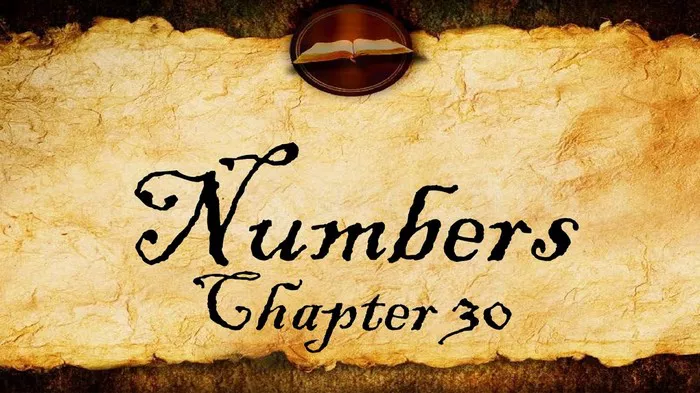Numbers Chapter 30 Summary
Numbers 30 details God‘s laws concerning vows and oaths, emphasizing the importance of keeping one’s word to the Lord. The chapter specifically addresses:
Men’s vows (v. 2): A man’s pledge to God was absolutely binding—once spoken, it had to be fulfilled.
Women’s vows (vv. 3-15): Unmarried women living under their father’s authority or married women under their husband’s authority could have their vows nullified if the male head of household objected on the day he heard of it. If he remained silent, the vow stood. However, widows and divorced women were fully responsible for their own vows.
This law protected family unity while ensuring that vows were made thoughtfully. The underlying principle was faithfulness—God expects His people to honor their commitments, but He also provides grace when authority figures intervene to prevent rash promises.
The chapter reinforces that words matter to God, teaching believers to speak with integrity and caution before making vows (Ecclesiastes 5:4-5).
Bible Numbers Chapter 30
Welcome to read Numbers Chapter 30. Here is the list of Numbers Chapter 30:
What Does Numbers Chapter 30 Teach Us?
Numbers 30 provides crucial instructions about vows, authority, and integrity, revealing God’s concern for both faithfulness and wisdom in human commitments. While the cultural context differs from modern life, the spiritual principles remain deeply relevant.
1. The Sacredness of Our Words (v. 2)
God declares that when a person makes a vow to Him, they must not break their word but must fulfill what they have promised. This establishes a key biblical principle: our words carry weight before God. Jesus later reinforces this in Matthew 5:37, teaching that our “yes” should mean yes and our “no,” no. Numbers 30 warns against careless oaths, reminding us that faithfulness in speech reflects our reverence for God.
2. The Role of Spiritual Authority (vv. 3-15)
The chapter outlines exceptions where a father or husband could annul a woman’s vow if he acted on the same day he heard it. This reflects:
Protection, not oppression – The law prevented rash vows that could harm the family.
Accountability in commitments – It encouraged consultation before binding promises were made.
Grace in leadership – Authority figures had the responsibility to intervene if a vow was unwise.
While modern applications differ, the principle remains: Godly authority should guide, protect, and correct—not dominate.
3. The Balance Between Law and Grace
Though vows were binding, God provided a way for unwise commitments to be nullified under proper authority. This shows that God’s laws are not rigid but merciful, allowing for intervention before consequences unfold.
Conclusion
Numbers 30 teaches us:
Our words matter to God – Whether vows, pledges, or everyday speech, integrity honors Him.
Accountability is vital – Seeking wise counsel before major commitments prevents harm.
God values both truth and grace – He demands faithfulness but provides safeguards against rash vows.
Ultimately, this chapter points to Christ, who perfectly fulfilled every vow to redeem us (2 Corinthians 1:20). As believers, we are called to live with sober-minded faithfulness, making commitments carefully and keeping them joyfully—knowing that God keeps His promises forever.
Related topics:


